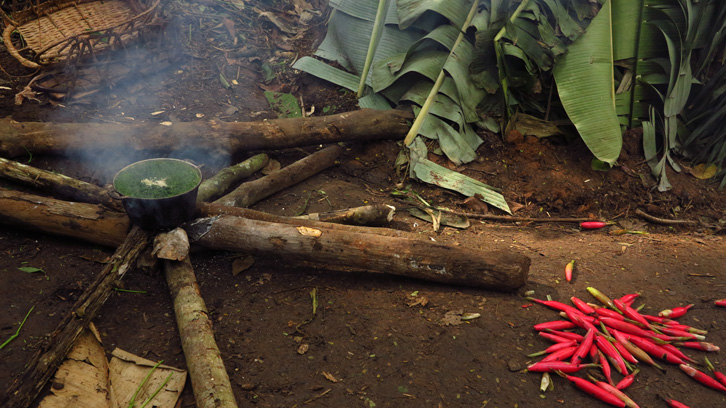Dietary transitions among three contemporary hunter-gatherers across the tropics

The diets of contemporary hunter-gatherer societies are diverse and highly nutritious, although the different pressures to which these groups are subjected are causing important changes in their food patterns. Specifically, factors such as the integration of market economy and its effects on food marketing are causing a nutritional transition in which traditional foods are being progressively replaced by processed foods, with higher content of sugar, salt and fat. Although it is known that these changes might have important effects on the health of the population, few empirical researches have systematically explored the mechanisms by which integration into the market economy alters the diet of hunter-gatherers populations.
To fill this gap, we analyzed in this study the diets of three indigenous groups in the process of incorporation into the market economy: the Tsimane 'in Bolivia, the Punan in Indonesia and the Baka in Cameroon. Specifically, we study the availability of foods at different times of the year, the origin of these foods (crops, wild foods, or market), and their accessibility in terms of time and money involved for obtaining them. We could see that the diets of the three societies are determined by the availability of food at different times of the year, with the dietary diversity that is reduced during the rainy season when it becomes difficult to practice hunting and fishing. We also found that the dependence on different sources of food (i.e., the market, the forest, and the agricultural fields) varied according to the level of market integration of each of the communities. The most isolated communities showed a greater level of diversity in the diet, associated with more frequent consumption of fruits, vegetables, meat and fish. Although the three societies continue to depend mostly on the forest and their agricultural fields for their food, access to market products seems to increase their consumption of oils, fats, sweets, sugar and spices, suggesting a process of nutritional transition. This work also shows that the different individual characteristics analyzed, such as income or dedication to different productive activities, do not affect diet, possibly due to the importance of food exchange in the societies studied. This paper appeals to continue deepening in the analysis of the dietary transition, and specifically in how the integration to the market also influences the alimentary preferences.
Department of Social and Cultural Anthropology
Researcher linked to ICREA at ICTA
Universitat Autònoma de Barcelona
References
Reyes-García, Victoria & Powell, Bronwen & Díaz-Reviriego, Isabel & Fernández-Llamazares, Álvaro & Gallois, Sandrine & Gueze, Maximilien. (2019). Dietary transitions among three contemporary hunter-gatherers across the tropics. Food Security. DOI: 10.1007/s12571-018-0882-4.

